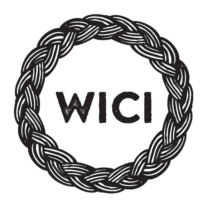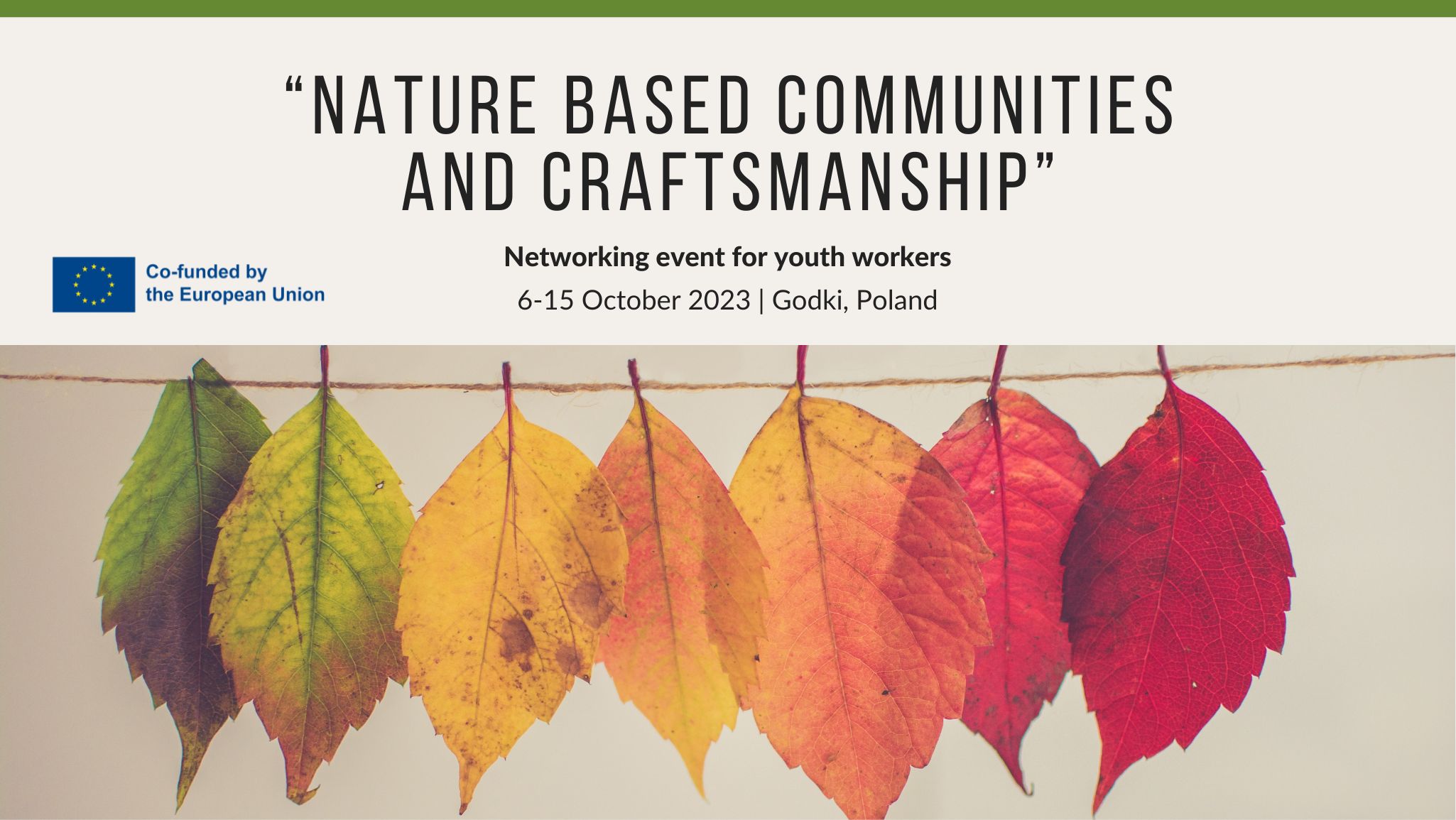About
“Nature-based Communities and Craftsmanship“ was a networking and community-building event for youth workers that was hosted on October 6–15, 2023, at the natural farm Gościnne i Edukacyjne Gospodarstwo Ekologiczne (Hospitable and Educational Organic Farm) in the local community of Godki in northern Poland. 22 youth workers from Poland, Croatia, Slovenia, and Romania joined the networking. The event was co-founded by the European Union within the Erasmus+ programme.
Partners and participants
The WICI Association collaborated with Asociatia de Teatru Experimental (Romania), Drustvo Lojtra (Slovenia), and Udruga Biom (Croatia) to design and carry out the project. The members present in Godki were direct representatives of the partner organisations from Poland, Croatia, Slovenia, and Romania. The profiles of participants present in Godki were: youth workers, educators, facilitators, trainers, activists, coaches, advisors, and youth leaders who work at local, national, and transnational levels with youth initiatives.



Idea
The project idea and design have been built on four main pillars.
Activities
The programme of the networking event consisted of activities based on non-formal education methodology and its principles. In our sessions, we implemented activities that were mainly held outdoors, such as group work, team-building activities, deepening questions, connection with nature, sensory walks, creative expression such as storytelling and authentic writing, rituals and practices based on the wisdom of native cultures, peer-to-peer learning, mentoring, hands-on activities, and so on.
Every activity was designed to facilitate the exchange of nature-based methods within the partnership and for each youth worker or educator to learn how to implement a variety of methods and to transfer the methods of their preference. We wanted to create a safe space based on trust and sharing, supporting learning, and building up relevant competencies to take back to their local community.
The event took place at a natural farm located within the hills of Warmia, creating a special, natural enclave and promoting a process of healthy living and natural farming. The farm provided the project participants with an opportunity to experience diverse plant life, organic veggies and fruit trees, herbs, honey, and the company of animals, creating a direct connection to nature.
Day-by-day programme
Day 1
Getting to know each other
Introduction to the programme; Getting to know the place & rules; Group Contract & Learning Goals; Community Building Time; Opening Council.
Day 2
Community Building
Sharing TIme; An hour alone in the nature and debriefing in the circle “Siedzisko” activity; Wild Herbal Crafts; Creating natural cosmetics & packaging; WICI Crafts (embroidery, linocut, band weaving); Poem; Community Building Time (incl. reflection); Storytelling (Viking Night).
Day 3
Nature Exploration
Sharing Time; Herbarium; Wild Herbal Crafts; Creating natural cosmetics & packaging; WICI Crafts (embroidery, linocut, band weaving); Wild Invitation; Community Building Time (incl. reflection); Networking.
Day 4
Natural Crafts
Sharing Time; WICI promotion of crafts; Wild Herbal Crafts; Creating natural cosmetics & packaging; WICI Crafts (embroidery, linocut, band weaving); Tool Fair; Community Building Time (incl. reflection); Networking.
Day 5
“Digestion”
Sharing Time; Dare to Dream; Time for the “digestion” of what we did so far and individual reflection; Community Building Time (incl. reflection); Networking.
Day 6
Harvesting
Sharing Time; Harvesting; Wild Cooking; Workshops in smaller groups; Partner workshop; Community Building Time (incl. reflection); Networking.
Day 7
The Future
Sharing Time; Documentation of our sessions; Wild Cooking; Workshops in smaller groups; Community Building Time (incl. reflection); Networking.
Day 8
Summary and final Evaluation
Sharing Time; What’s next? – dissemination plans; Erasmus opportunites & Youthpass; Networking + Final evaluation; Closing Council.
Nature and craft workshops
Embroidery is a technique of decorating fabric or other material with single or multi-coloured threads using different stitches. It used to be said that whoever embroidered should do so in good faith and health. Using magical thinking, it was believed that the creator’s energy was transferred to the object and stayed there forever. Anna Raczkowska invited the participants to learn the basics of this craft together over coffee and autumn sunshine. The participants had the opportunity to create their own works inspired by the surrounding nature.
Kilogrammes of salt and sugar appeared on the porch tables when Katarzyna Deka started a workshop on natural cosmetics. Participants had the opportunity to compose their own fragrant blends by adding the right combination of oils. Bath salts and sugar scrubs were created from available kitchen ingredients. Katarzyna demonstrated how to package the natural cosmetics in an ecological and interesting way for a gift.
Outdoor cooking is an excellent integration tool! At the networking meeting, we wanted to share with the participants the experience of cooking in a cauldron on an open fire. First, the participants went for a walk to collect plants that were used to enhance the flavour of the soup. They then made a fire and prepared a nutritious soup over it. The content of the cauldron was consumed, though everyone had a chance to have some more! The collection of edible plants and our cooks were assisted by Natalia Bagatela.
A herb garden, formerly herbarium (from Latin herba – herb), is a collection of dried plants or a place to store them. The word was used to refer to a herbal garden as well as a book on herbs containing a description of their medicinal properties and uses. Herbaria contained practical advice on the cultivation and harvesting of a particular species. Some of them carried legends and folk tales, and sometimes even records of the magical properties of plants. During the workshop, Natalia Bagatela introduced us to the ins and outs of the process of creating a herbarium, from harvesting to site description and use.
On the first day of the event we got to know Godki 22 Ecological and Hospitable Farm. Our guide was Jerzy, who told us the story of how the farm came to be. We visited the garden and the fields full of groats. Jerzy also shared his knowledge about tending the garden and the participants had the opportunity to learn about the tastes of, among other things, edible flowers.











Toolkit
A tangible result of the project is a free-to-download toolkit with all the key exercises and methods we tried during the project. They can be practiced individually or in groups. Click on the file or link under it to download the pdf.
Participants’ feedback
During the evaluation session, we asked the participants to share their reflections on the project, its highlights, and what they wanted to take home. Here are a few snippets from the session.
“I learn new methods that I would like to try at home and even modify.”
“Being here is like a big ocean of melisa in which I swim.”
“Using of plants was something that wanted to learn for the long time.”
“I was remained how supportive nature is for inner process.”
“The importance of rituals in daily life and in the group process and their steps.”
Gallery















You must be logged in to post a comment.